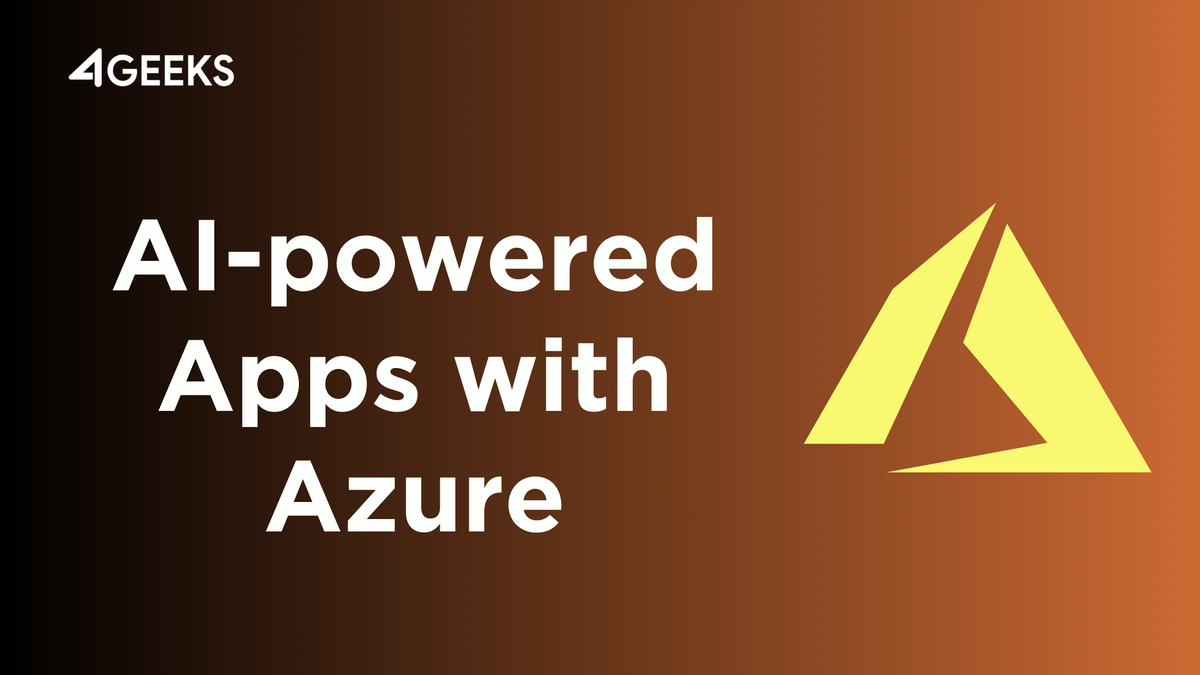Building AI-powered Applications with Azure Machine Learning: A Beginner's Guide

The rise of artificial intelligence (AI) has sparked a paradigm shift in various industries, empowering businesses to automate tasks, gain insights from data, and make smarter decisions. Azure Machine Learning (AML) is a cloud-based platform that democratizes AI development by offering a comprehensive suite of tools and services for building, training, deploying, and managing machine learning models.
This guide aims to provide beginners with a fundamental understanding of AML and equip them with the necessary tools to embark on their AI journey.
What is Azure Machine Learning?
Azure Machine Learning is a managed service platform that streamlines the end-to-end machine learning lifecycle, from data preparation and model training to deployment and monitoring. It offers a visual interface (Azure Machine Learning Studio) and a Python SDK for developers of all skill levels.
Key features of AML
- Visual interface: Azure Machine Learning Studio offers a drag-and-drop interface for building and deploying machine learning pipelines without writing code. This enables users with limited programming experience to get started with AI.
- Automated Machine Learning (AutoML): AutoML simplifies model training by automatically selecting and optimizing algorithms based on your data. This feature is ideal for beginners who are still learning about different machine learning models.
- Scalability: AML scales seamlessly to accommodate your growing data and computational needs. You can leverage the power of Azure cloud resources to train complex models efficiently.
- Integration with other Azure services: AML integrates seamlessly with other Azure services like Data Factory, Storage, and Cognitive Services, enabling you to build comprehensive AI solutions that address specific business needs.
Getting Started with Azure Machine Learning
- Create an Azure account: If you don't already have an Azure account, sign up for a free trial to access AML resources.
- Create an Azure Machine Learning workspace: This serves as your central hub for all your AI projects. You can create one through the Azure portal or Azure Machine Learning Studio.
- Explore Azure Machine Learning Studio: Familiarize yourself with the visual interface and its various components, including datasets, modules, and pipelines.
- Follow tutorials and documentation: Microsoft provides extensive documentation and tutorials to guide you through different aspects of AML. Start with the "Azure Machine Learning in a Day" tutorial to gain a comprehensive overview.
- Experiment with sample projects: The AML portal offers a collection of pre-built sample projects that showcase different use cases. These projects provide hands-on experience with model training and deployment.
Resources for Learning AML
Here are some resources to help you learn Azure Machine Learning:
- Books:
- "Microsoft Azure AI: A Beginner's Guide" by Rekha Kodali, Sankara Narayanan Govindarajulu, Mohammed Athaulla
- "Cloud Native AI and Machine Learning on Azure: Use SageMaker for building ML models, automate MLOps, and take advantage of numerous AWS AI services" by Premkumar Rangarajan
- Azure documentation
- Azure Machine Learning tutorials
Building your first AI application
Once you have gained a basic understanding of AML, you can start building your own AI applications. Here's a simple workflow to get you started:
- Define your problem: Identify a specific business problem you want to solve with AI.
- Prepare your data: Collect and prepare the data you'll use to train your model. This may involve cleaning, formatting, and transforming your data.
- Choose a machine learning model: Select the appropriate machine learning model for your problem. AML offers a range of pre-built models for different tasks like classification, regression, and computer vision.
- Train your model: Train the model on your prepared data using AML Studio or the Python SDK.
- Evaluate your model: Evaluate the performance of your model to ensure it meets your requirements. You can use metrics like accuracy, precision, and recall to assess your model's effectiveness.
- Deploy your model: Deploy your model to production so it can start making predictions on new data. AML offers various deployment options, including web services, containers, and Azure Functions.
- Monitor your model: Continuously monitor your model's performance and make adjustments as needed. AML provides tools for monitoring your model's health and identifying potential issues.
Building AI-powered applications with Azure Machine Learning can seem daunting at first, but with the right resources and guidance, anyone can get started.
Conclusion
As we stand at the precipice of a new era driven by artificial intelligence, Azure Machine Learning emerges as a powerful tool democratizing AI development and empowering businesses to extract valuable insights from their data.
This comprehensive platform offers a seamless end-to-end workflow, from data preparation and model training to deployment and monitoring, catering to both seasoned developers and those with limited coding experience.
From an engineering perspective, Azure Machine Learning presents several compelling advantages:
- Simplified Development: The intuitive visual interface enables engineers to build and deploy machine learning pipelines without writing code, accelerating the development process and promoting accessibility.
- Automated Model Selection: AutoML streamlines the model training process by automatically selecting and optimizing algorithms based on your data, freeing up valuable engineering resources.
- Scalability and Flexibility: Azure Machine Learning seamlessly scales to accommodate growing data and computational needs, enabling engineers to tackle complex projects efficiently. Moreover, its integration with other Azure services allows for building comprehensive AI solutions tailored to specific business requirements.
- Continuous Improvement: Azure Machine Learning provides comprehensive monitoring and logging tools, allowing engineers to gain valuable insights into their model's performance and identify areas for improvement. This facilitates continuous optimization and ensures the model remains relevant and effective over time.
Looking ahead, Azure Machine Learning will continue to evolve and play a pivotal role in shaping the future of engineering. It empowers engineers to:
- Develop innovative solutions: Leverage AI to tackle complex engineering challenges, automate tasks, and optimize workflows.
- Make data-driven decisions: Extract valuable insights from data to inform decision-making, improve efficiency, and drive business growth.
- Collaborate more effectively: Foster collaboration between data scientists and engineers, bridging the gap between data and application development.
- Stay competitive: Remain at the forefront of innovation by embracing AI and leveraging its capabilities to address new challenges and opportunities.
Azure Machine Learning (AML) offers a powerful platform for engineers to unlock the potential of artificial intelligence and drive innovation across diverse industries. With its ease of use, scalability, and continuous improvement capabilities, Azure Machine Learning empowers engineers to build intelligent applications that solve real-world problems and contribute to a more intelligent future. So, embrace the possibilities of AI and embark on your journey towards success with Azure Machine Learning.
FAQs
What are the specific costs associated with using Azure Machine Learning?
Azure Machine Learning costs vary based on several factors, including the compute resources used, data storage, and additional services like AutoML and integration with other Azure services. Azure offers a pay-as-you-go pricing model, which means costs can scale with usage. It's advisable to consult the Azure pricing calculator and review specific pricing details on the Azure website to estimate costs based on your project's requirements.
How can one ensure data privacy and security when using Azure Machine Learning?
Ensuring data privacy and security in Azure Machine Learning involves leveraging Azure's built-in security features. This includes using secure data storage solutions like Azure Blob Storage with encryption, implementing role-based access control (RBAC) to restrict access, and using Virtual Networks (VNets) to isolate your AML resources. Additionally, Azure provides compliance certifications and regular security updates to adhere to global standards, helping users maintain high levels of data protection and privacy.
What are some real-world examples of applications built using Azure Machine Learning?
Real-world examples of applications built with Azure Machine Learning include predictive maintenance in manufacturing, where machine learning models predict equipment failures to prevent downtime. Another example is in healthcare, where AML is used for personalized treatment plans by analyzing patient data to recommend tailored medical interventions. In retail, AML helps in demand forecasting and personalized marketing by analyzing customer behavior and purchasing patterns, enabling businesses to optimize inventory and enhance customer engagement.





